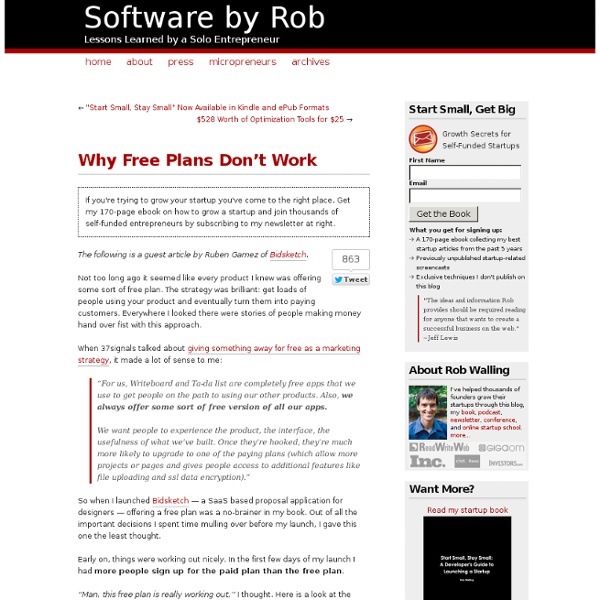Why Free Plans Don’t Work

Going Freemium: One Year Later
On September 1st, 2009 we announced that MailChimp was going freemium. On that day, we had 85,000 users. Now, slightly more than a year later, we have more than 450,000 users. We grew our user base five times in one year. Earlier this month, we actually doubled our freemium plan from 500 subscribers to 1,000 subscribers. So now, even more people can take advantage of MailChimp’s powerful email marketing and social features. Another thing that’s increased dramatically since going freemium is the number of lunches I’m invited to; seems entrepreneurs and VCs really want to "pick my brain" about how freemium is doing for us. See, I’ve heard a lot of discussion about MailChimp’s success with freemium, but it’s scary that people would want to model their companies around us. First, the stats Yeah, I know you’re just here for the numbers. "Yeah, but they’re all tiny customers, right?" 12% of our users had lists greater than 10k subscribers But at the end of August 2010, that 12% grew to 20%:
Market segmentation
Criteria for segmenting[edit] An ideal market segment meets all of the following criteria: It is possible to measure.It must be large enough to earn profit.It must be stable enough that it does not vanish after some time.It is possible to reach potential customers via the organization's promotion and distribution channel.It is internally homogeneous (potential customers in the same segment prefer the same product qualities).It is externally heterogeneous,( potential customers from different segments have different quality preferences).It responds consistently to a given market stimulus.It can be reached by market intervention in a cost-effective manner.It is useful in deciding on the marketing mix.It identifies the target customer(s) (surrogate(s))It provides supporting data for a market positioning or sales approach. Methods for segmenting consumer markets[edit] Geographic Segmentation[edit] Demographic Segmentation[edit] Behavioral Segmentation[edit] Lifestyle Segmentation[edit]
Getting the Most Out of the Freemium Model
By Demetrius Madrigal and Bryan McClain Published: December 6, 2010 “Freemium is a business model that provides users with free access to a service’s core functionality, but charges for additional or improved features.” Freemium business models seem to be gaining in popularity and rapidly becoming a dominant factor in the success of Web startups. Massively successful social-gaming companies like Zynga and Playdom have had a role in driving their adoption. These companies have been able to grow quickly and make substantial revenues through a combination of ad sales and charging small amounts of money for additional game items and features. Freemium is a business model that provides users with free access to a service’s core functionality, but charges for additional or improved features. In this month’s column, we’ll discuss methods of getting the most out of the freemium model and maximizing the likelihood that users of basic, free services will start paying for premium features. Conclusion
Related:
Related:



